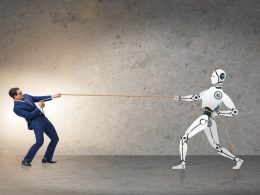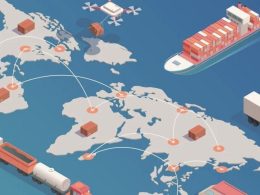Artificial Intelligence (AI) has emerged as a transformative force in various sectors, driving innovation and efficiency. Its role in global development is particularly noteworthy, as it offers unprecedented opportunities to tackle some of the world’s most pressing challenges. From healthcare and education to agriculture and environmental conservation, AI is poised to make significant contributions to sustainable development. This article delves into how AI is shaping global development, focusing on key areas where its impact is most profound.
Healthcare: Revolutionizing Medical Services

AI is revolutionizing healthcare by enhancing diagnostic accuracy, personalizing treatment plans, and improving patient outcomes. In developing countries, where access to quality healthcare is often limited, AI-driven solutions can bridge the gap. For instance, AI algorithms can analyze medical images to detect diseases such as tuberculosis and malaria with high accuracy, even in remote areas where specialized medical professionals are scarce.
Moreover, AI-powered telemedicine platforms enable remote consultations, allowing patients in underserved regions to receive medical advice from experts worldwide. Predictive analytics, another AI application, can forecast disease outbreaks by analyzing patterns in data, enabling timely interventions and resource allocation.
Education: Enhancing Learning and Accessibility
AI is also transforming education by providing personalized learning experiences and making education more accessible. Intelligent tutoring systems can adapt to individual learning styles and paces, offering customized content and feedback. This personalization helps students grasp complex concepts more effectively and at their own pace.
In regions with limited access to quality education, AI-driven platforms can democratize learning. Online courses and educational resources powered by AI can reach students in remote areas, offering them the same opportunities as their urban counterparts. Additionally, AI can assist in language translation, breaking down linguistic barriers and making educational content accessible to a broader audience.
Agriculture: Boosting Productivity and Sustainability
Agriculture is another sector where AI is making significant strides. By leveraging AI technologies, farmers can optimize crop yields, reduce waste, and promote sustainable practices. Precision agriculture, which uses AI to analyze data from sensors and drones, allows farmers to monitor soil health, weather conditions, and crop growth in real-time. This information enables them to make informed decisions about irrigation, fertilization, and pest control, ultimately enhancing productivity and reducing environmental impact.
AI-powered predictive analytics can also forecast crop yields and market trends, helping farmers plan their planting and harvesting schedules more effectively. In developing countries, where agriculture is a primary source of livelihood, these advancements can significantly improve food security and economic stability.
Environmental Conservation: Protecting Natural Resources
AI is playing a crucial role in environmental conservation by enabling more effective monitoring and management of natural resources. Machine learning algorithms can analyze satellite imagery to detect deforestation, illegal mining, and other environmental threats in real-time. This information allows authorities to take swift action to protect endangered ecosystems.
Moreover, AI can optimize the management of natural resources such as water and energy. For instance, AI-driven systems can predict water demand and supply, helping to manage water resources more efficiently. In the energy sector, AI can optimize the operation of renewable energy sources, such as wind and solar power, by predicting weather patterns and adjusting energy production accordingly.
Economic Development: Driving Innovation and Efficiency
AI is a powerful driver of economic development, fostering innovation and efficiency across various industries. By automating routine tasks and optimizing processes, AI can significantly boost productivity and reduce costs. This increased efficiency can lead to economic growth, job creation, and improved living standards.
In addition, AI can support small and medium-sized enterprises (SMEs) by providing them with tools and insights that were previously only accessible to large corporations. For example, AI-powered analytics can help SMEs understand market trends, optimize supply chains, and enhance customer experiences. By leveling the playing field, AI can promote inclusive economic development and reduce inequalities.
Challenges and Ethical Considerations

While the potential of AI in global development is immense, it is essential to address the challenges and ethical considerations associated with its deployment. One of the primary concerns is the digital divide, as access to AI technologies is unevenly distributed. Bridging this gap requires investments in digital infrastructure, education, and capacity-building, particularly in developing countries.
Data privacy and security are also critical issues, as AI systems often rely on vast amounts of data. Ensuring that data is collected, stored, and used ethically is paramount to protecting individuals’ privacy and preventing misuse. Additionally, transparency and accountability in AI decision-making processes are crucial to building trust and ensuring fair outcomes.
Moreover, the potential displacement of jobs due to automation is a significant concern. While AI can create new opportunities, it can also render certain jobs obsolete. Addressing this challenge requires proactive measures, such as reskilling and upskilling programs, to prepare the workforce for the changing job landscape.
Conclusion
AI holds immense potential to drive global development and address some of the world’s most pressing challenges. From revolutionizing healthcare and education to boosting agricultural productivity and promoting environmental conservation, AI can significantly contribute to sustainable development. However, realizing this potential requires addressing the associated challenges and ethical considerations, ensuring that the benefits of AI are accessible to all. By fostering collaboration and investing in the necessary infrastructure and education, we can harness the power of AI to create a more inclusive and sustainable future.










